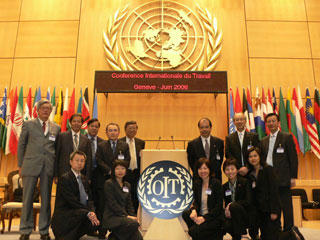Anuual Report 2006
Chapter 1
Highlights of the Year 2006
Employment remains a subject of public concern despite continued improvement in the labour market, with the unemployment rate coming down from 8.5 per cent in mid-2003 to 4.4 per cent at the end of 2006. In the year, we had adopted new measures to better help the less-educated secure work and launched the Wage Protection Movement. Taking a proactive and pragmatic approach with united efforts, the Labour Department had again achieved notable results in various programme areas in 2006.
Employment Services
Enhanced Employment Services
Upholding a proactive, innovative, flexible and cost-effective approach in further strengthening our employment service to help the unemployed re-enter the labour market and meet the recruitment needs of employers, we held 15 large-scale job bazaars and 65 district-based job fairs in the year to assist job-seekers in finding jobs and employers in recruiting staff. A record high of 118 937 placements were secured through the Labour Department in 2006. The number of vacancies obtained from the private and public sectors, at 486 134, had also broken past records. Meanwhile, the Interactive Employment Services (iES) website (www.jobs.gov.hk) recorded a historic high of 947 million page views in 2006 and continued to be the most heavily visited government website.
New Job Centres set up in Yuen Long and North District
To strengthen the employment service for job-seekers residing in remote areas, the Labour Department set up a new job centre each in Yuen Long and North District in September, bringing the total number of job centres to 12. The new job centres provide a full range of employment services including disseminating up-to-date vacancy information; providing job-search facilities; as well as arranging job referrals, job matching, employment briefings, and district-based job fairs, etc.

Youth Work Experience and Training Scheme (YWETS)
To recognise the continuous support of employers for YWETS, a presentation ceremony to acknowledge 22 enterprises as "Youth Employment Home Base" - an honourable title for socially responsible employers supporting youth employment - was organised in November for the first time. These employers have, over the years, provided a large number of on-the-job training places to YWETS and offered sustainable employment opportunities to trainees upon completion of the training.
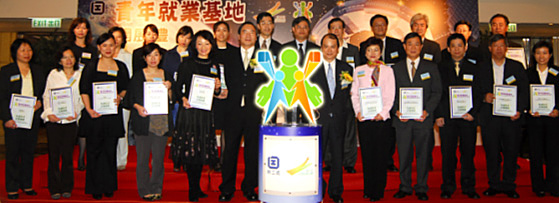
Youth Pre-employment Training Programme (YPTP)
In August, we organised the Prize Presentation Ceremony for the "Most Improved Trainees" of YPTP to present awards to trainees achieving significant improvements in self-development, leadership, as well as social and community services, and to commend the caring efforts of training bodies. The striving stories of trainees had provided the best encouragement to their counterparts and solidly exemplified the achievements of training bodies, employers and the Government in nurturing the development of the young generation.
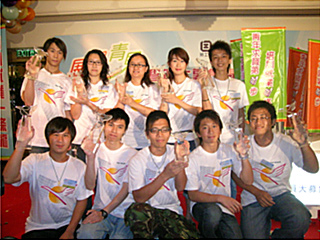
Outstanding Disabled Employees Award and Enlightened Employers Award
These awards are presented to employees with disabilities for their outstanding performance at work and employers for their efforts in providing employment opportunities for people with disabilities. In 2006, 12 disabled employees and 10 employers won the awards.
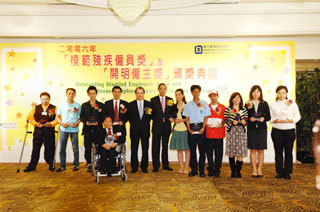
Labour Relations
Record High Settlement Rate
The number of working days lost as a result of labour disputes in Hong Kong is among the lowest in the world. Of the 199 labour disputes and 24 958 claims handled in the year, 70.7 per cent were resolved by our conciliation efforts, a record high since 1994. The waiting time for conciliation meetings was further shortened from 2.4 weeks in 2005 to 2.3 weeks in 2006.
Stepping Up Enforcement Against Wage Offences
In 2006, the Labour Department sustained its all-out efforts to combat wage offences. Territory-wide inspection campaigns targeted at offence-prone trades were launched. We collected intelligence on non-payment of wages through an early warning system in collaboration with trade unions and continued to tackle wage default problems in the catering industry through the exercise codenamed Operation COMBAT.
During the year, the Employment Ordinance was amended to raise the maximum penalty for wage offences to a fine of $350,000 and imprisonment for three years. The Employment Claims Investigation Division continued to conduct in-depth investigation into suspected wage offences, and to employ former veteran police officers to strengthen the investigative work and collection of intelligence in order to take out speedy prosecution. The department adjusted its enforcement strategy so that prosecution would also be taken out against responsible persons of companies for wage offences.
The department had also stepped up its educational and promotional efforts to remind employers of their statutory obligation to pay wages on time and to encourage employees to lodge claims promptly and come forward as prosecution witnesses.
With rigorous enforcement efforts, a total of 785 convicted summonses on wage offences were secured in 2006; an all-time high and up 33.7 per cent over that of 587 summonses in 2005. Two company directors and one other employer were given custodial sentences for defaulting wage payments. In addition, an employer was fined $114,000 for committing wage offences.
Enhancing Labour Management Cooperation and Tripartite Dialogue
To promote harmonious labour relations, a "Workshop on Labour Management Co-operation" was organised in March for employers and trade union representatives. Experts of the International Labour Organization were invited to share with participants the global trends and overseas experience in implementing staff consultation and labour management co-operation practices. In November, a large-scale seminar on tripartite co-operation was staged to promote tripartite communication among the Government, employers and employees. Feature topics including tripartite communication, labour management collaboration and staff communication were well received by the participants.
Employees' Rights and Benefits
Vigorous Enforcement against Illegal Employment
In 2006, the Labour Department mounted more intelligence-led operations with the Police and the Immigration Department to clamp down on illegal employment activities. The number of such operations reached 189, up 7 per cent as compared to 176 in 2005. A total of 502 suspected illegal workers and 231 employers suspected of employing illegal workers were arrested in the joint operations.
In the year, we widely publicised the complaint hotline (2815 2200) to encourage the public to report illegal employment activities. A new leaflet was produced and circulated to over two million households as an enclosure in water bills during the billing cycle from July to October 2006 to remind the public not to employ illegal workers.
Wage Protection Movement for Cleaning Workers and Security Guards (WPM)
The Chief Executive announced in his 2006 Policy Address that the Government would join hands with the business community and labour sector to launch the WPM. Entities participating in the WPM should pay their cleaning workers and security guards wages not lower than the relevant average market rates, and enter into written employment contracts with these workers. If the workers have to work beyond contractual hours, they should also be suitably compensated.
The Labour Department will continue implementing the WPM through a multi-pronged strategy of promotion, public education, contractual regulation, conciliation and enforcement. A dedicated webpage (www.labour.gov.hk/eng/service/protection/index.htm) and a hotline (2852 3815) have been set up to provide information on the movement and handle enquiries.
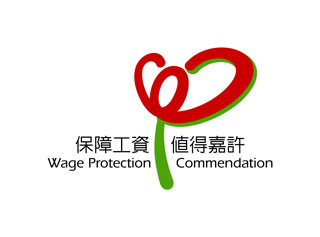
Safeguarding the Rights of Employees of Government Service Contractors
We continued to conduct vigorous inspections to workplaces of non-skilled workers employed by government service contractors in order to protect their statutory rights and benefits under labour laws. In the year, a total of 659 inspections were conducted. We took out resolute prosecution against contractors who breached the laws. A total of 12 contractors were convicted on 62 summonses.
Drop in Applications for Protection of Wages on Insolvency Fund
The Labour Department continued its all-out efforts in clamping down at source on employers evading their wage liabilities, thus preventing wage defaults from developing into claims on the Protection of Wages on Insolvency Fund. The number of applications for the Fund decreased from 9 967 in 2005 to 7 532 in 2006, a record low since 1996. The Fund registered a surplus of $345 million for 2006, the third year that the Fund recorded a surplus since the Asian financial crisis in 1997.
Safety and Health at Work
New Occupational Health Clinic
The Kwun Tong Occupational Health Clinic of the Labour Department has been providing clinical occupational health service for workers in Hong Kong since its establishment in 1993. In view of the growing demand, the Labour Department set up the new Fanling Occupational Health Clinic in June 2006 to strengthen its clinical service in the New Territories.
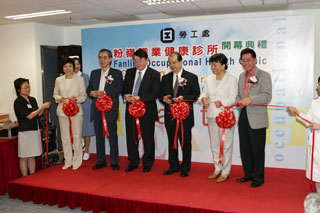
Safety of Renovation and Maintenance Works
To enhance the safety performance of renovation and maintenance works, the Labour Department continued to intensify enforcement actions to clamp down on offending contractors by further stepping up point-to-point inspections on normal working days, at night and during holidays. Territory-wide blitz operations were also launched resulting in 121 suspension/improvement notices issued and 81 prosecutions taken out. On the educational and promotional front, we held safety talks and seminars as well as staged large-scale promotional campaigns to enhance the safety awareness of people in the trade. We also jointly launched with the Occupational Safety and Health Council a Small and Medium Enterprise Subsidy Scheme to financially assist contractors and employers in need to purchase suitable fall protection equipment to improve the safety standard of working-at-height.
Safety Award Schemes
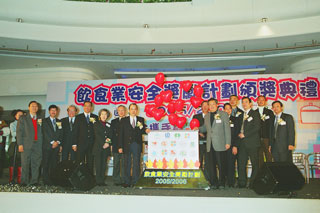
Strengthening Local and International Partnerships
Labour Day Reception
On 28 April 2006, the Secretary for Economic Development and Labour Mr Stephen Ip hosted a cocktail reception at the Hong Kong City Hall to celebrate Labour Day and to pay tribute to the workforce. The Chief Executive Mr Donald Tsang Yam-kuen officiated at the reception, with guests from trade unions, employer associations and other organisations.
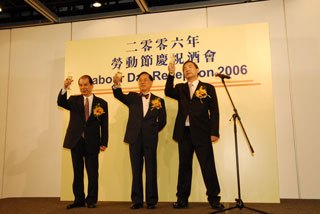
Contacts with Other Labour Administrations
We maintain active liaison and interflow with other labour administrations through visits and participation in relevant activities. In February 2006, the Permanent Secretary for Economic Development and Labour (Labour) Mr Matthew Cheung Kin-chung led a delegation to visit the Ministry of Labour and Social Security of the State Council in Beijing and met with Minister Tian Chengping.
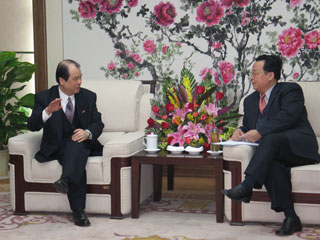
In June, the Permanent Secretary for Economic Development and Labour (Labour) Mr Matthew Cheung Kin-chung led a tripartite team comprising government, employer and employee representatives to attend the 95th Session of the International Labour Conference in Geneva as part of the Chinese delegation. In August 2006, the Assistant Commissioner for Labour (Employees' Rights and Benefits) Mrs Jenny Chan also led a tripartite team to attend the 14th Asian Regional Meeting in Busan in the name of "Hong Kong, China". Through participation in the events, the representatives kept abreast of the latest development of international labour matters, and strengthened their connections with officials of the International Labour Organization as well as their counterparts in the employer and employee sectors.
In October, the Assistant Commissioner for Labour (Occupational Safety and Health) Mr TSO Sing-hin led a delegation to Dongguan, Guangdong to attend the first Pan-Pearl River Delta Regional Work Safety Co-operation Joint Conference and Work Safety Co-operation and Development Forum, and signed the Pan-Pearl River Delta Regional Work Safety Co-operation Agreement. The objective of the Agreement is to enhance work safety co-operation among nine Mainland provinces (including Fujian, Jiangxi, Hunan, Guangdong, Guangxi, Hainan, Sichuan, Guizhou and Yunnan), Hong Kong Special Administrative Region (HKSAR) and Macao Special Administrative Region.
